
Sprache & Sprachen
Scope & Guideline
Advancing Knowledge in Language Studies
Introduction
Aims and Scopes
- Linguistic Analysis and Comparative Studies:
The journal emphasizes comparative linguistic studies, examining phonetic, grammatical, and lexical elements across languages, such as the consonantal shifts in Germanic and Armenian or the analysis of modal potentials in German and Russian. - Language and Culture Interactions:
A core focus is on the interplay between language and culture, exploring how language reflects cultural identity and transfer, as seen in studies of cultural transfer through language learning apps and metaphors involving birds. - Language Education and Pedagogy:
The journal addresses language teaching methodologies, particularly in the context of German as a foreign language, discussing the effectiveness of visual aids in textbooks and the relevance of grammar in language instruction. - Sociolinguistics and Language Change:
Sociolinguistic themes are prevalent, with research examining the evolution of language in societal contexts, such as the masculinity of legal language and the implications of address forms during the pandemic. - Literary and Historical Linguistics:
The journal also delves into literary analysis and historical linguistics, showcasing works that explore postmodern literature and the syntax of dialects, thus bridging literature and linguistic theory.
Trending and Emerging
- Impact of Technology on Language Learning:
The increasing focus on technology's role in language education, particularly through language learning apps, indicates a trend towards integrating digital tools in pedagogical practices. - Language and Gender Studies:
The exploration of gender dynamics within language, such as the examination of masculine language in legal contexts, reflects an emerging interest in sociolinguistic dimensions and their implications for equality and representation. - Cross-Cultural Linguistic Studies:
A growing trend towards examining linguistic phenomena across different cultures, as seen in the comparative studies of address forms and cultural expressions, suggests a rising interest in global linguistic interconnectedness. - Hybridization in Language Use:
The study of hybrid linguistic forms, including the blending of languages in creative expressions (e.g., noodle verses), points to an emerging fascination with linguistic fluidity and the dynamics of multilingualism.
Declining or Waning
- Traditional Grammar Instruction:
Despite previous interest, there seems to be a waning focus on traditional grammar as a standalone subject, with newer studies leaning towards context-based and communicative approaches in language teaching. - Historical Linguistics in Isolation:
Research solely centered on historical linguistics without a contemporary application or sociocultural context has decreased, indicating a shift towards more integrative approaches that combine historical insights with modern linguistic practice. - Literary Analysis of Canonical Texts:
There appears to be a reduced emphasis on canonical literary texts in favor of contemporary works and genre studies, reflecting a broader trend towards inclusivity and representation in literary analysis.
Similar Journals
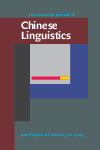
International Journal of Chinese Linguistics
Pioneering Studies in Chinese LinguisticsInternational Journal of Chinese Linguistics is a distinguished publication that delves into various aspects of linguistic studies pertaining to the Chinese language. Published by John Benjamins Publishing Co, this journal stands out for its commitment to advancing the knowledge and understanding of Chinese linguistics within the global academic community. With an impact factor that places it in the Q2 quartile of linguistics and language, the journal is indexed in prominent databases, achieving ranks of #501 in Arts and Humanities and #580 in Social Sciences. These rankings reflect the journal's dedication to maintaining high scholarly standards and its relevance in both linguistic research and practical applications. While not categorized as Open Access, the journal provides necessary access through institutional subscriptions, thereby ensuring that valuable research reaches a broad audience. Covering a wide range of topics from syntax and phonetics to sociolinguistics and applied linguistics, the International Journal of Chinese Linguistics serves as an essential resource for researchers, professionals, and students seeking to deepen their understanding of the intricate relationship between language and culture in the Chinese context. With converging years from 2019 to 2024, it continues to evolve, reflecting ongoing developments in the field.
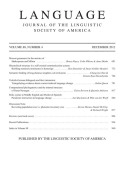
LANGUAGE
Pioneering Research in Linguistics and LanguageLANGUAGE, published by the Linguistic Society of America, is a premier academic journal dedicated to the rigorous study of linguistic theory and practice. With an ISSN of 0097-8507 and E-ISSN 1535-0665, this esteemed journal has established itself as a leading publication in the field of linguistics since its inception. The journal has consistently maintained a high impact factor, being ranked in the Q1 category in Linguistics and Language for 2023, placing it among the top tier of academic journals. Notably, it also holds impressive Scopus rankings, being positioned at #75 out of 1088 in Arts and Humanities, and #89 out of 1167 in Social Sciences, demonstrating a significant impact and reach in the discipline. While it is not an open-access journal, LANGUAGE provides crucial insights into linguistic research, fostering a vibrant academic community. Spanning years from 1996 to 2024, it continues to be an essential resource for researchers, professionals, and students alike, aiming to advance the understanding of language in its myriad forms and functions.

Cognitive Studies-Etudes Cognitives
Advancing the Frontiers of Cognitive ResearchCognitive Studies-Etudes Cognitives, published by the Polish Academy of Sciences, Institute of Slavic Studies, is a prominent open-access journal based in Poland, dedicated to advancing research in the interdisciplinary fields of cognitive studies, communication, and linguistics. Since its inception, the journal has made a significant impact in the academic community, evidenced by its ranking in the Scopus database within the top 30% for Language and Linguistics. With an aim to bridge theoretical insights and practical applications, Cognitive Studies invites contributions that explore the complex interplay between language, cognition, and technology, making it a vital resource for researchers, professionals, and students alike. As the journal continues to grow, it remains committed to maintaining rigorous standards for publication while fostering an inclusive environment for innovative ideas and diverse perspectives. The journal is easily accessible and aims to facilitate knowledge dissemination, proudly offering open access since 2014.

Rasprave
Advancing linguistic knowledge through open dialogue.Rasprave is a distinguished open access journal published by the Institute of Croatian Language and Linguistics in Croatia, dedicated to advancing the field of linguistics and language studies. With an ISSN of 1331-6745 and E-ISSN 1849-0379, the journal has embraced open access since 2007, making its research widely available to scholars globally. It holds an important position in the academic community, particularly noted for its 2023 Scopus ranking within the Arts and Humanities and Social Sciences categories, falling into the 59th and 56th percentiles respectively. The journal’s impact is further reflected in its Q3 quartile ranking in linguistic and language studies, showcasing its relevance and growing influence in this vibrant field. Rasprave aims to publish innovative research that deepens understanding of language dynamics, linguistic theory, and sociolinguistics, making it an essential resource for researchers, professionals, and students seeking to enrich their knowledge and contribute to the academic discourse surrounding language.
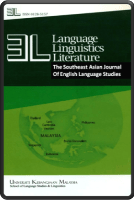
3L-Language Linguistics Literature-The Southeast Asian Journal of English Language Studies
Navigating Contemporary Issues in Southeast Asian Language Studies3L-Language Linguistics Literature - The Southeast Asian Journal of English Language Studies is a prestigious academic journal published by Penerbit Universiti Kebangsaan Malaysia, showcasing the dynamic field of linguistics, language studies, and literature. With an open access policy since 2006, this journal aims to disseminate high-quality research and critical analyses, catering to an international audience of researchers, academics, and practitioners. The journal has achieved impressive rankings, positioning it in the Q2 category for Linguistics and Language, and Q1 for Literature and Literary Theory in 2023, reflecting its significant impact in these fields as evidenced by a remarkable Scopus ranking of #27/1106 in Literature and Literary Theory, placing it in the 97th percentile. This makes 3L an essential resource for those seeking to engage with contemporary issues and innovations within the Southeast Asian context and beyond. With a commitment to advancing knowledge in language and literature, 3L fosters a vibrant scholarly community dedicated to excellence in research.

REVUE DE LINGUISTIQUE ROMANE
Pioneering Research in Linguistics and CultureREVUE DE LINGUISTIQUE ROMANE, published by the esteemed SOCIÉTÉ LINGUISTIQUE ROMANE, is a prominent academic journal dedicated to the exploration of Romance linguistics. With its ISSN 0035-1458, the journal plays a significant role in advancing knowledge within the fields of linguistics and the history and philosophy of science. Although it does not currently offer Open Access, it provides critical insights and peer-reviewed research that are indispensable for scholars, educators, and students interested in the nuances of Romance languages. The journal, which has seen converged coverage from 2006 to 2017, and then again from 2019 to 2021, is ranked in the third quartile (Q3) across various categories within Scopus, reflecting its established presence in the academic community. As a vital resource for interdisciplinary studies, REVUE DE LINGUISTIQUE ROMANE is instrumental for those seeking to deepen their understanding of linguistic structures, cultural nuances, and the historical development of Romance languages.

LINGUISTIQUE
Innovating Perspectives on Linguistic PhenomenaLINGUISTIQUE, an esteemed journal published by PRESSES UNIV FRANCE, serves as a vital platform for scholarly discourse in the fields of linguistics and language studies. With its ISSN 0075-966X and E-ISSN 2101-0234, this French journal has been a significant contributor to the understanding of linguistic phenomena since its inception in 2004, and it continues its journey through to 2024. Although currently categorized in the Q4 quartile for both Arts and Humanities (miscellaneous) and Linguistics and Language, its commitment to publishing quality research encourages a diverse range of articles, reviews, and innovative studies. Positioned in the 32nd and 29th percentiles for its respective fields according to Scopus rankings, LINGUISTIQUE is dedicated to advancing knowledge and stimulating engagement among researchers, professionals, and students alike. While it does not offer open access, the journal remains an essential resource for those who seek to deepen their understanding of linguistic principles in a global context, facilitating a richer discourse that connects theory with practice.

Cuadernos de Linguistica Hispanica
Innovating Research in Hispanic Linguistic StudiesCuadernos de Linguistica Hispanica is a distinguished open access journal published by UNIV PEDAGOGICA & TECNOLOGICA COLOMBIA, dedicated to advancing research in the field of linguistics and language studies since its inception. With an ISSN of 0121-053X and E-ISSN 2346-1829, this journal has established itself as an important platform for scholars to share innovative findings and insights within the linguistics community. As a Q3-ranked journal in linguistics and language according to 2023 category quartiles, it occupies a significant position in Scopus rankings, showcasing its commitment to quality and relevance. With the aim to foster scholarly discourse and promote understanding of the Hispanic linguistic landscape, the journal welcomes contributions that explore a diverse range of topics and methodologies. The journal has embraced open access since 2008, ensuring that research is accessible to a broader audience, thus enhancing its impact and engagement within both academic and professional spheres.
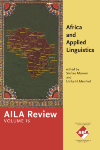
AILA Review
Unveiling insights into language acquisition and application.AILA Review, published by John Benjamins Publishing Co, stands as a pivotal resource within the field of linguistics and language studies. With an ISSN of 1461-0213 and an E-ISSN of 1570-5595, this journal is dedicated to fostering innovative research and scholarship that advances the understanding of language in its diverse forms and applications. Spanning significant years from 2003 to 2016 and 2018 to 2024, AILA Review has established itself with a commendable reputation, reflected by its Q2 ranking in Linguistics and Language and notable Scopus rankings, positioning it in the 73rd percentile among Arts and Humanities. As an essential forum for researchers, professionals, and students alike, the journal invites high-quality contributions that engage with theoretical and practical aspects of language acquisition, multilingualism, and applied linguistics, enhancing discourse in these vital areas of study. Although not an open-access journal, its commitment to quality ensures that publications are widely recognized and cited, fostering impactful scholarly exchanges.
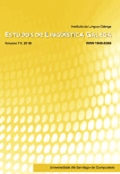
Estudos de Linguistica Galega
Unveiling the Nuances of Galician LinguisticsEstudos de Linguistica Galega, an esteemed journal published by the University of Santiago de Compostela, provides a critical platform for scholars engaged in the vibrant field of linguistics, particularly focusing on the Galician language and its surrounding linguistic phenomena. Launched in 2009, this Open Access journal enables unrestricted dissemination of research, facilitating engagement from a global audience. With an impact factor that positions it within the Q4 quartile in Linguistics and Language, it reveals a strong commitment to advancing the discourse in this niche. It ranks #691 out of 1088 in the Arts and Humanities category, underscoring its relevance in the academic landscape. The journal aims to foster collaboration and innovation among researchers and practitioners, making significant contributions to understanding linguistic diversity and its implications in contemporary society. Located in Santiago de Compostela, Spain, the journal encourages submissions that explore theoretical, empirical, and applied linguistic studies, thereby inviting researchers, professionals, and students to contribute to this growing field.